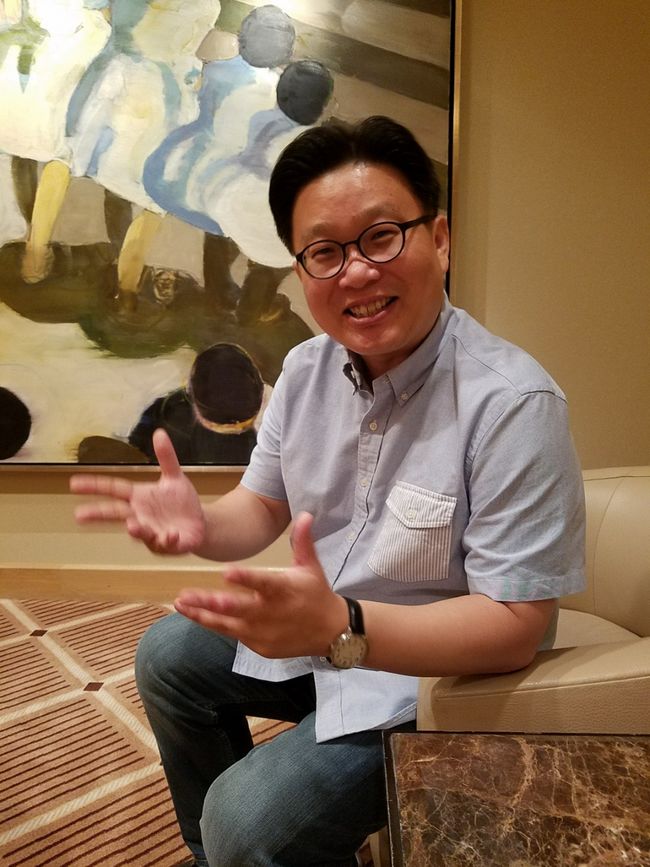
Sungshin Women’s University professor Kyung-duk Seo, better known for his advocate work to raise Korea’s visibility around the world, visited Los Angeles last Thursday to lecture at the 2017 America King Sejong Institute Workshop.
Seo is the director of Sejong Institute. His lecture centered on “Korean culture’s challenge towards the world.” The lecture was attended by educators and employees from Sejong Institute in other countries, including Canada, Colombia, Mexico, and Brazil. The Korea Daily met with Seo, who has long been known for his work in promoting the Korean culture, to talk about his mission.
-What was the main subject of your lecture?
“To explain simply, it was about how to teach the Korean language in an easier and more fun way. The foundation (Sejong Institute) has created videos, textbooks and other educational systems as teaching tools, but it has been sufficient, to be honest. Teaching in a classroom setting becomes naturally rigid. So, I talked about how to utilize Korea’s cultural contents to teach the language. What we need to some education outside of the classroom.”
-Could you explain in detail what you mean by education outside of the classroom?
“There is a project we’re running along with the Sejong Institute students around the world since the beginning of this year. The mission is to correct what is not correct about the Korean language. At national parks in the U.S., there are brochures and signs written in Korean, but a lot of it has been poorly translated. We’ve been making the little efforts to correct those mistakes. It’s not only fun but also rewarding.”
-How has the project worked out so far?
“Whenever anyone sees a public information written in Korean that is incorrect anywhere in the world, they are welcome to report it to us. We’ve been getting reports from all over the world and it has exceeded our expectations, really. Some of them have been reported from L.A., in fact. The students and our foundation have made an effort to correct those errors. We also send prize money to students who’ve run the projects successfully. It’s obviously not something we can completely change overnight, but consistency will eventually make a big improvement.”
-The project you started with actress Hye-kyo Song is garnering a lot of attention.
“The situation is obviously different in the U.S., but there are people around the world who doesn’t know that Korea has its own language. When you visit a worldly renowned museum, I often see English, Japanese, Chinese, French, Spanish and German brochures to guide the visitors, but many of them are missing Korean. Having Korean brochures at those places will make a big difference. Even as a Korean, knowing that efforts are being made around the world to accommodate Koreans gives me a feeling of comfort anywhere I go. LACMA and Getty are obviously excellent at this as well as museums in New York now.” (Seo is the person who has distributed Korean brochures to Museum of Modern Art and Museum of Natural Science in New York as well as the Museum of Fine Arts in Boston. Recently, he has partnered with Hye-kyo Song to distribute 10,000 Korean brochures at historical sites in Japan.
-You’ve made many advertisements to promote Korea. Is there a reason you do it so regularly in the U.S. in particular?
“Does the entire world read Le Monde or Yomiuri Shimbun? The New York Times is read by the global readers around the world. The Wall Street Journal is also read by the world’s best financiers. I’m an advertisement specialist. It is costly to advertise through the American media, but the effects are huge.”
-What can L.A. do to promote Korea?
“L.A. is a really important city. The Korean culture here in L.A. in itself could be a sample. For some form of Korean culture to be accepted in the U.S., it has to start in L.A. for it to spread to Houston, Chicago, and other American cities. To reiterate, L.A. will always have to be a starting point in this process. New York is a good location to establish a reputation, but L.A. is a place where a variety of Korean cultural materials can naturally establish themselves.”
-How has the perception of Korea around the world changed over the last 10 years?
“It has changed now that K-pop has become so popular. Most people now at least know what kind of country Korea is. K-pop and Korean dramas have obviously played a big role. However, we now have to look ahead to the next 10 years. If we’ve tried to promote the existence of Korea to people who didn’t know our country until today, we now have to work towards encouraging people around the world to enjoy the Korean culture.”
By Sooyeon Oh





